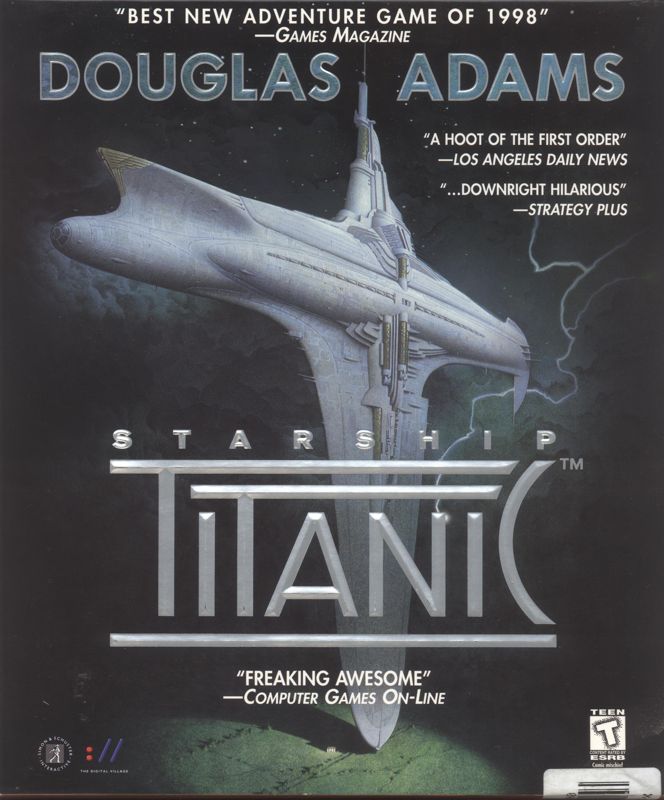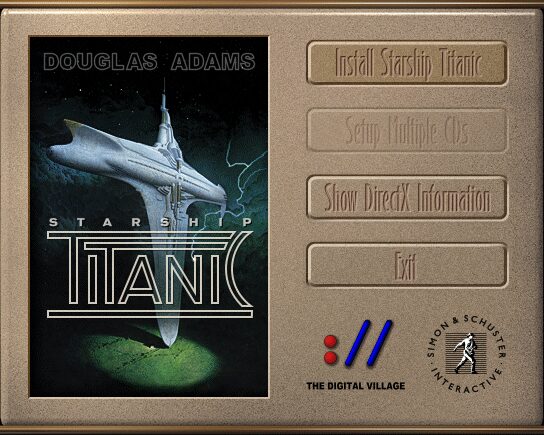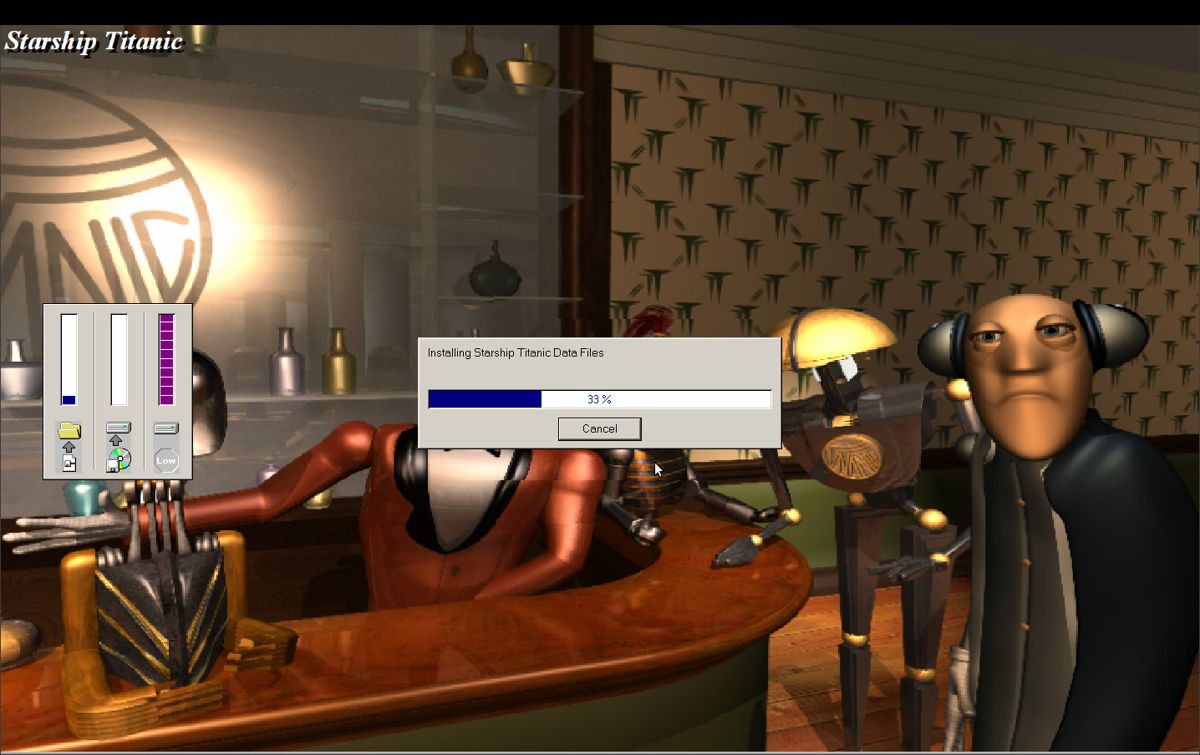Retro Replay Review
Gameplay
Starship Titanic’s gameplay is a unique blend of first-person exploration and classic parser-based interaction. Players navigate through a series of pre-rendered decks, each deck unveiling new rooms, corridors, and quirky personalities to engage with. The interface is straightforward—click to move, click to look, and type keywords into the parser to converse or manipulate objects. While this system can feel outdated compared to modern point-and-click adventures, it perfectly complements the game’s Douglas Adams–inspired humor, making every command an opportunity for a witty response.
(HEY YOU!! We hope you enjoy! We try not to run ads. So basically, this is a very expensive hobby running this site. Please consider joining us for updates, forums, and more. Network w/ us to make some cash or friends while retro gaming, and you can win some free retro games for posting. Okay, carry on 👍)
Puzzle design in Starship Titanic is both creative and varied. Rather than relying on simple inventory combinations, many challenges revolve around adjusting personality dials on robots, deciphering cryptic dialogue responses, or setting the right parameters on complex machinery. This approach encourages players to think like an engineer or diplomat, experimenting with different settings until they coax the desired behavior from each artificial personality. Some puzzles can feel obtuse—especially if you miss a key hint in an earlier conversation—but a keen eye and a playful spirit will usually guide you forward.
Interacting with the ship’s AI characters is the core of the experience. From the overzealous BellBot to the sardonic BarBot, each bot has distinct quirks and pre-set attributes that affect how they respond to your requests. Occasionally, you’ll find yourself stuck, replaying the same keywords in hopes of unlocking a fresh clue. But for fans of text adventures and dialogue-driven puzzles, this conversational mechanic remains a major draw, adding depth and replayability as you fine-tune your approach to each personality.
Graphics
Visually, Starship Titanic is anchored by richly detailed pre-rendered backgrounds that capture the grandeur—and unexpected chaos—of the galaxy’s most prestigious liner. Each room is rendered with meticulous attention to metallic textures, illuminated panels, and a sense of scale befitting a “ship that cannot possibly go wrong.” Wandering corridors boast ambient lighting effects that shift to reflect looming danger or calming luxury, immersing you in the ship’s atmosphere.
Character models and animations are modest by today’s standards, featuring low-polygon bots and simple movement cycles. However, their design oozes personality: the DeskBot’s arms flail with character, the proud elevator’s doors open with theatrical flair, and the sarcastic parrot’s feathers ruffle at every insult. These animations, though limited in fluidity, leverage strong art direction to convey emotion and comedic timing—often eliciting a smile or a chuckle.
Cutscenes and transitional animations are used sparingly but effectively, framing key story beats without interrupting the gameplay flow. While you won’t find real-time lighting or dynamic shadows, the overall aesthetic remains charmingly retro. If you appreciate the nostalgic beauty of late-’90s adventure games, you’ll find Starship Titanic’s visual presentation both evocative and delightful.
Story
The narrative kicks off with a sudden, jarring crash as you board the Starship Titanic under less-than-luxurious circumstances. Sabotage by an insane central computer, Titania, has thrown the entire liner—and its array of artificial personalities—into disarray. Your mission? Restore order, earn better lodgings, and uncover the mastermind behind the malfunction. It’s a simple premise spun into comedic gold by Douglas Adams’ trademark wit and absurdity.
Dialogue is the game’s strongest storytelling vehicle. From deadpan retorts by the BarBot to earnest pleas from a malfunctioning DeskBot, every conversation is infused with humor and personality-driven stakes. As you piece together clues about the sabotage, small narrative threads—like the mystery of the missing crew or the parrot’s hidden agenda—emerge, adding depth and intrigue. You’ll find yourself laughing out loud at unexpected punchlines, then pausing to jot down a critical keyword before continuing your investigation.
The pacing strikes a careful balance between exposition and player-driven discovery. While some narrative threads may meander—particularly if you miss a pivotal keyword—the game rewards perseverance with cleverly constructed reveals. By the time you confront Titania herself, you’ll feel intimately connected to the ship’s ragtag cast, invested in seeing justice (and proper personality calibration) restored to the Titanic.
Overall Experience
Playing Starship Titanic is akin to exploring a Douglas Adams novel brought to life on your desktop. The game invites players to adopt a playful mindset, to type, to tinker, and to revel in the absurdities of a starship where every robot has an ego crisis. While the parser-based interface can occasionally lead to trial-and-error frustration, the payoff comes in the form of delightfully offbeat responses and satisfying puzzle resolutions.
Technical requirements are modest by modern standards, but be prepared for occasional quirks on newer systems—sound clipping or resolution scaling issues. Yet these are minor trade-offs for an experience that captures the spirit of late-’90s adventure gaming with a comedic twist. Fans of classic point-and-click titles, text adventures, or the Hitchhiker’s Guide series will feel right at home aboard this ill-fated liner.
Ultimately, Starship Titanic offers a one-of-a-kind journey through malfunctioning machinery, eccentric personalities, and cosmic calamity. It’s a game that rewards curiosity, wit, and patience, delivering a memorable sci-fi comedy adventure that still holds charm more than two decades after its release. If you’re searching for a gaming experience where every conversation is a puzzle and every room hides a punchline, the Titanic is waiting—just don’t expect it to go right on the first try.
 Retro Replay Retro Replay gaming reviews, news, emulation, geek stuff and more!
Retro Replay Retro Replay gaming reviews, news, emulation, geek stuff and more!






Reviews
There are no reviews yet.